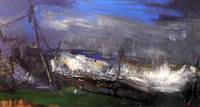Brueggemann in Texts that Linger, Words that Explode, chapter 5 ‘The Scandal and Liberty of Particularity.’ –
I shall suggest that the maintenance of a self-aware, self-conscious alternative identity in the face of totalism is precisely the practice of character ethics that aims to generate and authorize liberated “agents of their own history”; such practice depends upon the great “thickness” of the community that makes possible such liberated agents on a day-to-day basis. (61)
Israel is seen then, as a counter-community that practiced relentless, dense memory as an alternative to the ‘co-opting amnesia of the empire’. He points to the way the story of exodus is character forming and liturgy becomes a launch pad for conversation, but more creates a different world; finally it is learning your history in which recitation defines the memory for generations to come. Bauckham says it this way, ‘ We are always beginning again and again from the biblical narratives, which still open up unexpected possibilities for our own future within the future of Jesus Christ. (21).
In many ways New Zealand is in it’s history dealing with this matter of particularity . In many ways it is of vital importance as it seeks to reflect upon and even shake off the shackles of ‘colonial’ past and find its particular, owned story which incorporates the Maori story(along with the wider cultural diversity here today). It is equally the case for the churches here which wrestle in the present tensions of debate much of which is the tension between ‘the co-opted amnesia’ of their heritage of Presbyterianism and how things are done by good order, which buffers up today with what I would say is the ‘Kiwi’ will to have a go! For instance, there is much radical talk about mission and liberating structures, but in the next it seems to me that more legislation and tightening procedures etc. counter the potential. Why? Is it a fear to move from the colonial Presbyterian (empirical) past into the mission Dei ? There is such opportunity here. Perhaps we need to re-discover in the history here and biblically the liberty of the particularity in the story that will help reshape and reform us.
On a more general note, I have had a course to take and write some papers through in Church History in Aotearoa. One I really enjoyed getting into was Parihaka – Te Whiti. It reveals some of what I am reflecting on here. "Parihaka is a moral, political and spiritual provocation to Māori and Pakēha to turn their anger at the past to the pursuit of peace and righting the historic injustices in the present and future.’ (Paul Morris “ The provocation of Parihaka: reflections on spiritual resistance in Aotearoa” In Parihaka: The Art of Passive Resistance p105-116)
I shall suggest that the maintenance of a self-aware, self-conscious alternative identity in the face of totalism is precisely the practice of character ethics that aims to generate and authorize liberated “agents of their own history”; such practice depends upon the great “thickness” of the community that makes possible such liberated agents on a day-to-day basis. (61)
Israel is seen then, as a counter-community that practiced relentless, dense memory as an alternative to the ‘co-opting amnesia of the empire’. He points to the way the story of exodus is character forming and liturgy becomes a launch pad for conversation, but more creates a different world; finally it is learning your history in which recitation defines the memory for generations to come. Bauckham says it this way, ‘ We are always beginning again and again from the biblical narratives, which still open up unexpected possibilities for our own future within the future of Jesus Christ. (21).
In many ways New Zealand is in it’s history dealing with this matter of particularity . In many ways it is of vital importance as it seeks to reflect upon and even shake off the shackles of ‘colonial’ past and find its particular, owned story which incorporates the Maori story(along with the wider cultural diversity here today). It is equally the case for the churches here which wrestle in the present tensions of debate much of which is the tension between ‘the co-opted amnesia’ of their heritage of Presbyterianism and how things are done by good order, which buffers up today with what I would say is the ‘Kiwi’ will to have a go! For instance, there is much radical talk about mission and liberating structures, but in the next it seems to me that more legislation and tightening procedures etc. counter the potential. Why? Is it a fear to move from the colonial Presbyterian (empirical) past into the mission Dei ? There is such opportunity here. Perhaps we need to re-discover in the history here and biblically the liberty of the particularity in the story that will help reshape and reform us.
On a more general note, I have had a course to take and write some papers through in Church History in Aotearoa. One I really enjoyed getting into was Parihaka – Te Whiti. It reveals some of what I am reflecting on here. "Parihaka is a moral, political and spiritual provocation to Māori and Pakēha to turn their anger at the past to the pursuit of peace and righting the historic injustices in the present and future.’ (Paul Morris “ The provocation of Parihaka: reflections on spiritual resistance in Aotearoa” In Parihaka: The Art of Passive Resistance p105-116)




